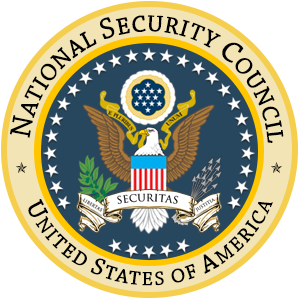
We’ve all heard of the National Security Council, but how many people actually know much about it? All I’ve ever really known is that it is an executive body comprised of individuals who perform some kind of advisory function to the U.S. president, mostly on foreign policy matters. But what exactly do they do? How many people are on it? Is there a public record one can look up to find out who sits on this council at any given time and what their background is?
The council was created by the 1947 National Security Act signed by Harry Truman, which he did against the advice of his Secretary of State George Marshall who thought it gave too much unaccountable power to the organs of the national security state that it was creating, particularly the CIA.
Its members include relevant cabinet heads and deputies (e.g. Secretary of Defense, Secretary of State, National Director of Intelligence, National Security Adviser, etc.), but there’s much more to the National Security Council than meets the eye as Daniel Bessner’s book review of John Gans’ White House Warriors for The New Republic outlines. Bessner describes the crucial yet opaque role of the council as conveyed by former insider Gans as follows:
Compared to its better-known counterparts, the National Security Council remains something of a mystery. Headquartered in the Eisenhower Executive Office Building, next to the White House and a block away from the Council on Foreign Relations, the NSC bridges the gap between the intellectuals and decision-makers of the foreign policy establishment. The council, in short, is a core institution of the “military-intellectual complex,” the network of organizations that since the late-1940s have provided government officials with the ideas they rely on to make foreign policy. If the military-industrial complex builds the weapons of American empire, the military-intellectual complex develops the concepts that determine where such weapons are actually used.
Ultimately, it is a story that underlines the problems with centralizing power in a White House controlled by an unaccountable cohort of “the best and the brightest” whose records suggest they are anything but.
The historical justification for the creation of the National Security Council (NSC), the CIA and the formal Department of Defense in 1947 is that FDR had overseen WWII in an ad hoc fashion that was seen as inefficient and with blurred lines of jurisdiction. With the new Cold War having emerged against the Soviet Union, it was considered especially important to organize and consolidate foreign policy power within the executive branch. Of course, there were other motivations involved in creating these unaccountable institutions than just smoothing out the kinks in administration.
According to Bessner’s review, the NSC didn’t get much attention from the president until the Korean War. It was then that Truman started parlaying the NSC to a larger and more centralized role. Many successive presidents would further this trend, paving the way for the “imperial presidency” that we have today, with the NSC as one of its most powerful tools.
Read the full review here.
After a recent meeting between Trump and the Polish president, it was agreed that Washington would send 1,000 more logistical troops to the Eastern European country, bringing the total to around 5,000. Although the Polish government has made it clear that it wants to host even more, including a tank division. Reportedly, Poland also agreed to buy 32 of Lockheed Martin’s white elephant F-35 fighter jets. Military exercises in Poland place NATO troops within shouting distance of the Russian enclave of Kaliningrad – one of those dubious ideas that the “best and brightest” in Washington keep pushing.
At the recent St. Petersburg International Economic Forum, Putin finally provided some public comments on Ukraine’s newly elected president, expressing caution with respect to Zelensky’s total lack of experience in public office. In response to the question about Zelensky during a panel discussion, Putin gave a very interesting description of the skills needed to be an effective leader, particularly in the foreign policy arena. Watch the 3-1/2 minute video below. By the way, I always encourage people who ask me about Putin to watch or read his interviews directly as much as possible in order to avoid the misinformation often provided by American establishment media and politicians who have their own agenda.
The campaign to help fund the publication of my forthcoming book “The View from Moscow: Understanding Russia and U.S.-Russia Relations” is ongoing. Thank you to Gideon Anthony for his $100 donation.
We still have a ways to go to reach the goal. All donations, large or small, are greatly appreciated in helping me get this book out to the world. Thank you.
https://www.gofundme.com/help-fund-my-book-explaining-russia-to-americans